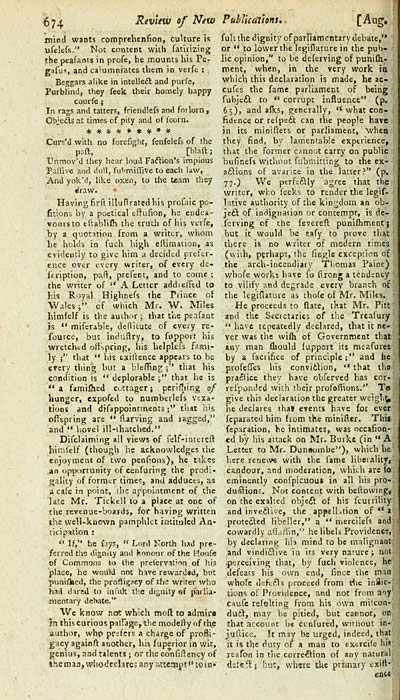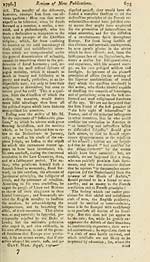Download files
Complete book:
Individual page:
Thumbnail gallery: Grid view | List view

674
Review of New Publicalions*
[Aug.
mind wants comprehenfion, culture is
ufelefs.'' Not content with fatirizing
the peafants in profe, he mounts his Pe-
gafus, and ca'umnrates them in verfe :
Beggars alike in intelle£l and purfe,
Purblind, they feek their homely happy
courfe ;
In rags and tatters, friendlefs and forlorn ,
Obje£ls at times of pity and of fcorn.
Curs'd with no forefisht, fenfelefs of the
psft, [Waft ;
Unmov'd they hear loud Faftion's impious
Paffive and dull, fubmiffive to each law,
And yok"d, hke oxen, to the team they
•iraw.
Having firft illunratcdhis profaic po-
fitions by a poetical effufion, he endca-
voQrsto eftabliih the truth of his vtrfe,
by a quotation from a writer, whom
he holds in fuch high eflimation, as
evidently to give him a decided prefer-
ence over every writer, of every de-
Icription, part, prefent, and to come ;
the writer of " A Letter addiefftd to
his Royal Highnefs the Piince of
Wales;" of which Mr. W. Miles
himfelf is the author ; that tlie peafant
is '• miferable, deditute of every re-
fource, but induilry, to fupport his
wretched offspring, his hclplefs fami-
ly ;" that " his txiltence appears to be
every thing but a bleffing ;" that his
condition is " deplorable i" that he is
"a famifhed cottager; periniing of
hunger, expofed to numberlefi vexa-
tions and difappointmenrs ;" tiiat his
offspring are '* (larving and jagged,"
and " hovel ill-ihatched."
Difclaiming all views of felf-inicrcft
himlelf (though he acknowledges the
enjoyment of two penfions), he takes
an opportunity of cenfuring the prodi-
gality of former timei, and adduces, as
a cafe in point, the appointment of the
late Mr. Tickcll to a place at one of
tlie revcnue-boajds, for having written
the well-known pamphlet intituled An-
ticipation :
*' If," he fays, « Lord North had pre-
ferred tiie dignity and honour of the Houf^
of Commons to the prefer vit 'in of his
place, he would not have reward«d, but
punillaed, the profligacy of th; writer wlio
>iad darsd to infuk tlic dignity el parlia-
mentary dehate."
We know not which moft to admira
Jn this curious palfage, the modefly of tl\C
author, whp prefers a charge of profti-
gdcy againft another, his fuperior in wic,
genius, and talents ; or the confiflency of
shemanjWhodechres any attempt** coin*
fult the dignity of parliamentary debate,"
or ** to lower the legiflature in the pub- '
lie opinion," to be dcferving of punifh-
ment, when, in the very work ia
which this declaration is made, he ac-
cufes the fame parliament of being
fubjeft to " corrupt influence" (p.
65), and afks, generally, '* what con-
fidence or relp^ft can the people have
in its miniflers or parliament, when
they find, by lamentable experience,
that the former cannot carry on public
bufinefs without fiibrnitting to the ex-
aftions of avarice in the latter?" (p.
77.) We perfcftly agree that the
writer, who (eeks to render the legif-
lative authority of the kingdom an ob-
jeft of indignation or contempt, is de-
ferving of the fevered punilhment;
but it would be eafy to prove that
there is no writer of modern times
(with, perhaps, the fingle exception of
the arch-incendiaiy Thomas Paine)
whofe worki have fo lirong a tendency
to vilify and degrade every branch at
the Icgiflature as thofe of Mr. Miles.
He proceeds to (late, that Mr. Pitt '
and the Seci claries of the Treafury
'* have repeatedly declared, that it ne-
ver was the wiftj of Government that
my man fliould lupporl its nuafures
by a faciifice of principle;" and he
profeffes his convi6tion, ♦• that the
practice they have obferved has cor-
rcfponded with their profoffions." T«s
give this declaration the greater weigT,^
he declares that events have for ever
feparated him from the minifter. This
feparaiion, he intimates, was occafion-
«d by his attack on Mr. Burke (in " A
Letter to Mr. Duneombe"), which he
here renews with the fame libeiality,
candour, and moderation, which are fo
eminently confpicuous in all his pro-
du(?lions. Not content with beftowing,
on the exalted objeft of his fcutrility
and inve61ive, the appellaion of ** a
protefled libeller," a " niercilefs and
cowardly afLilTin," he libeU Providence,
by declaring hia mind to be malignant
and vindi£live in its very nature; not
f)erceiving that, by fuch violence, he
defeats his own end, fince the msn
whofe deft6ls proceed from tlie inftic-'
tions of Providence, and not from a-iy
caufe refulting horn his own milcon-
du61, may be pitied, but cannot, on
that account ba ctnfured, witiiout in-
jutvice. It may be urged, indeed, that
it is the duty of a man to exercife hii'
reafon in tlie corre^ion of any natural}
dstc^i but, whsre the primary exift-!
ence
Review of New Publicalions*
[Aug.
mind wants comprehenfion, culture is
ufelefs.'' Not content with fatirizing
the peafants in profe, he mounts his Pe-
gafus, and ca'umnrates them in verfe :
Beggars alike in intelle£l and purfe,
Purblind, they feek their homely happy
courfe ;
In rags and tatters, friendlefs and forlorn ,
Obje£ls at times of pity and of fcorn.
Curs'd with no forefisht, fenfelefs of the
psft, [Waft ;
Unmov'd they hear loud Faftion's impious
Paffive and dull, fubmiffive to each law,
And yok"d, hke oxen, to the team they
•iraw.
Having firft illunratcdhis profaic po-
fitions by a poetical effufion, he endca-
voQrsto eftabliih the truth of his vtrfe,
by a quotation from a writer, whom
he holds in fuch high eflimation, as
evidently to give him a decided prefer-
ence over every writer, of every de-
Icription, part, prefent, and to come ;
the writer of " A Letter addiefftd to
his Royal Highnefs the Piince of
Wales;" of which Mr. W. Miles
himfelf is the author ; that tlie peafant
is '• miferable, deditute of every re-
fource, but induilry, to fupport his
wretched offspring, his hclplefs fami-
ly ;" that " his txiltence appears to be
every thing but a bleffing ;" that his
condition is " deplorable i" that he is
"a famifhed cottager; periniing of
hunger, expofed to numberlefi vexa-
tions and difappointmenrs ;" tiiat his
offspring are '* (larving and jagged,"
and " hovel ill-ihatched."
Difclaiming all views of felf-inicrcft
himlelf (though he acknowledges the
enjoyment of two penfions), he takes
an opportunity of cenfuring the prodi-
gality of former timei, and adduces, as
a cafe in point, the appointment of the
late Mr. Tickcll to a place at one of
tlie revcnue-boajds, for having written
the well-known pamphlet intituled An-
ticipation :
*' If," he fays, « Lord North had pre-
ferred tiie dignity and honour of the Houf^
of Commons to the prefer vit 'in of his
place, he would not have reward«d, but
punillaed, the profligacy of th; writer wlio
>iad darsd to infuk tlic dignity el parlia-
mentary dehate."
We know not which moft to admira
Jn this curious palfage, the modefly of tl\C
author, whp prefers a charge of profti-
gdcy againft another, his fuperior in wic,
genius, and talents ; or the confiflency of
shemanjWhodechres any attempt** coin*
fult the dignity of parliamentary debate,"
or ** to lower the legiflature in the pub- '
lie opinion," to be dcferving of punifh-
ment, when, in the very work ia
which this declaration is made, he ac-
cufes the fame parliament of being
fubjeft to " corrupt influence" (p.
65), and afks, generally, '* what con-
fidence or relp^ft can the people have
in its miniflers or parliament, when
they find, by lamentable experience,
that the former cannot carry on public
bufinefs without fiibrnitting to the ex-
aftions of avarice in the latter?" (p.
77.) We perfcftly agree that the
writer, who (eeks to render the legif-
lative authority of the kingdom an ob-
jeft of indignation or contempt, is de-
ferving of the fevered punilhment;
but it would be eafy to prove that
there is no writer of modern times
(with, perhaps, the fingle exception of
the arch-incendiaiy Thomas Paine)
whofe worki have fo lirong a tendency
to vilify and degrade every branch at
the Icgiflature as thofe of Mr. Miles.
He proceeds to (late, that Mr. Pitt '
and the Seci claries of the Treafury
'* have repeatedly declared, that it ne-
ver was the wiftj of Government that
my man fliould lupporl its nuafures
by a faciifice of principle;" and he
profeffes his convi6tion, ♦• that the
practice they have obferved has cor-
rcfponded with their profoffions." T«s
give this declaration the greater weigT,^
he declares that events have for ever
feparated him from the minifter. This
feparaiion, he intimates, was occafion-
«d by his attack on Mr. Burke (in " A
Letter to Mr. Duneombe"), which he
here renews with the fame libeiality,
candour, and moderation, which are fo
eminently confpicuous in all his pro-
du(?lions. Not content with beftowing,
on the exalted objeft of his fcutrility
and inve61ive, the appellaion of ** a
protefled libeller," a " niercilefs and
cowardly afLilTin," he libeU Providence,
by declaring hia mind to be malignant
and vindi£live in its very nature; not
f)erceiving that, by fuch violence, he
defeats his own end, fince the msn
whofe deft6ls proceed from tlie inftic-'
tions of Providence, and not from a-iy
caufe refulting horn his own milcon-
du61, may be pitied, but cannot, on
that account ba ctnfured, witiiout in-
jutvice. It may be urged, indeed, that
it is the duty of a man to exercife hii'
reafon in tlie corre^ion of any natural}
dstc^i but, whsre the primary exift-!
ence
Set display mode to: Large image | Transcription
Images and transcriptions on this page, including medium image downloads, may be used under the Creative Commons Attribution 4.0 International Licence unless otherwise stated. ![]()
| Early Gaelic Book Collections > Ossian Collection > Gentleman's magazine, and historical chronicle > Volume 66, Part 2 > (150) |
|---|
| Permanent URL | https://digital.nls.uk/79423571 |
|---|
| Description | Selected books from the Ossian Collection of 327 volumes, originally assembled by J. Norman Methven of Perth. Different editions and translations of James MacPherson's epic poem 'Ossian', some with a map of the 'Kingdom of Connor'. Also secondary material relating to Ossianic poetry and the Ossian controversy. |
|---|
| Description | Selected items from five 'Special and Named Printed Collections'. Includes books in Gaelic and other Celtic languages, works about the Gaels, their languages, literature, culture and history. |
|---|

